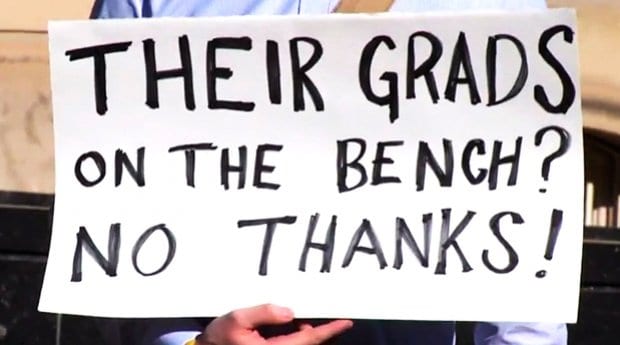When I first heard about Trinity Western University’s plan to open a Christian law school, I shrugged. Unlike lawyer Clayton Ruby, I was neither alarmed nor opposed.
Why shouldn’t a Christian university have the opportunity to form its own legion of lawyers, steeped in its own morals and values, to bring forward the Christian community’s best arguments in court? Our community has certainly benefited from the skills and sound arguments presented by our own corps of lawyers, who have ably defended our rights and advocated for our interests in courts across the country, incrementally turning the tide in our favour over the last few decades.
Arguably, our time had come, but it likely wouldn’t have come without the cogent representation of our community’s lawyers, who convinced courts at all levels that we deserve to be protected from discrimination, to have equal access to state-regulated benefits and to have our relationships legally recognized.
If we get to present our best arguments in court, why shouldn’t our opponents?
Because the school they propose to open won’t even allow openly gay students to enroll, Ruby says.
To attend Trinity Western, students must adhere to a covenant promising to uphold biblical Christian values and abstain from any sex that “violates the sacredness of marriage between a man and a woman.” Students who break the covenant risk being expelled.
“It’s immoral and unconscionable and we think unconstitutional,” Ruby told Xtra a year ago, before suing the BC government for approving the school (the government backed down Dec 11).
The covenant will create a “queer quota” on incoming law students by limiting the number of seats openly gay students in Canada could apply for, Ruby warned. “The door has moved a little more tightly closed against gays and lesbians becoming lawyers and judges. A crucial part of democratic life is the openness of the profession.”
If a crucial part of democracy is our equal access to the law and those who practise it and judge its application, I still support the idea of a Christian law school, particularly as courts continue to struggle to balance gay rights and religious freedoms. It’s Trinity Western’s covenant that’s the sticking point.
“I support freedom of religion,” lesbian lawyer barbara findlay told a special meeting of members of the BC law society who convened in June to challenge the society’s initial approval of the law school. “You have every right to believe I am a sinner,” she said, “but when your religious belief turns into action that discriminates against me, that’s when you cross the line.”
What’s at stake, Trinity Western president Bob Kuhn replied, is the right to hold an opposing view, “as unpopular as that might be.”
I’m inclined to agree with Kuhn every time I reread this exchange — until I remember the covenant. I’m willing to wrestle with opposing views and even to debate them in court no matter how high the stakes may be. So why isn’t Kuhn willing to drop his covenant? If he’s so willing to engage opposing views, why limit the views admitted to his school? Why explicitly reject the views most likely to oppose his own?
As long as the covenant stands, I salute the thousands of lawyers and law students across the country who have stepped forward to vociferously oppose a school they consider discriminatory. Allies and queer people alike, they are holding their profession to account, convincing their peers and demanding better decisions when law societies and the government accept a school they believe will diminish the law and the people who practise it.
Does that make the Christian university the villain in this story? Only so long as it clings to its unnecessary and discriminatory covenant.
Robin Perelle is the managing editor of Xtra Vancouver.

 Why you can trust Xtra
Why you can trust Xtra


